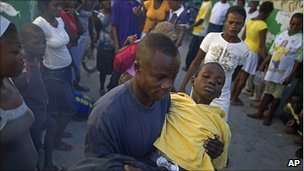UN expects an upsurge of Cholera in hurricane-stricken Haiti

The United Nations expects an uptick in cholera cases in Haiti, where 477 new suspected cases have been reported since Hurricane Matthew tore through the country, authorities said Friday.
The storm’s impact increased the risk of waterborne diseases like cholera due to flooding and a damaged sanitation infrastructure, Fadela Chaib, a Haiti representative for the UN World Health Organization (WHO) and Pan American Health Organization (PAHO), said in a statement.
Cholera was already present in several of the most affected areas before the Category 4 storm hit the south part of the poorest country of the western Hemisphere.
More than 800,000 cases of cholera have been reported and an estimated 9,300 people have died since its outbreak in Haiti six years ago, according to the UN. At its peak in 2011, cholera cases were reaching an average of 6,766 every week, the global body said.
It added that approximately 771 new cases were being reported every week in 2016 with 28,559 total cases so far, and multiple localized outbreaks resulted in Red Alert notifications for 12 municipalities in the Grande Anse, Ouest, Artibonite and Nord departments.
On Thursday, the UN announced it has deployed medical staff to Haiti to treat outbreaks reported after Matthew.
“We are seriously concerned about an epidemic of cholera, and that’s why the Ministry of Health, with our assistance, is taking all measures possible to avoid that happening,” Jean Luc Poncelet, a Haiti representative for WHO and PAHO, said in a statement.
More than 1.4 million Haitians are in urgent need of humanitarian assistance after Matthew struck seven of the country’s 10 administrative departments, killing 546 people, according to the Civil Protection Directorate.
Approximately 120,000 houses were destroyed or damaged and the number of people in makeshift shelters exceeds 175,500, the agency said Friday.
Since the emergency, nearly 20 people have been killed by cholera, Health Minister Daphne Benoit Delsoin said.
More than half of the cases have been registered in Grand-Anse, one of the hardest-hit departments, she added.
The appearance of the disease, typically contracted through contaminated food or water, was blamed on the UN’s Nepalese peacekeepers based in Haiti after a devastating earthquake of 2010. The strain of the illness observed in the country is endemic in Nepal, researchers found.
Last month, UN Secretary General Ban Ki-moon accepted responsibility for the cholera outbreak in the Caribbean country and said he would prepare a “material” package of assistance worth $181 million to assist with the emergency. The global body will also provide the same amount to compensate those affected and their families.
Relevant UN agencies have since dispatched shipments of cholera kits containing oral rehydration solutions, catheters and water chlorination treatments to help patients with acute diarrhea and cholera.
How to submit an Op-Ed: Libyan Express accepts opinion articles on a wide range of topics. Submissions may be sent to oped@libyanexpress.com. Please include ‘Op-Ed’ in the subject line.
- Aguila, Turkish Envoy Discuss Cooperation - January 14, 2025
- Sahara Bank Officials Jailed in 53m Dinar Credit Fraud - January 14, 2025
- Oil platform runs aground off northern Tunisian coast - January 14, 2025


